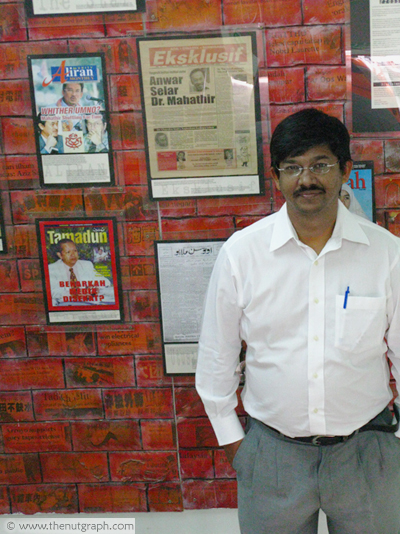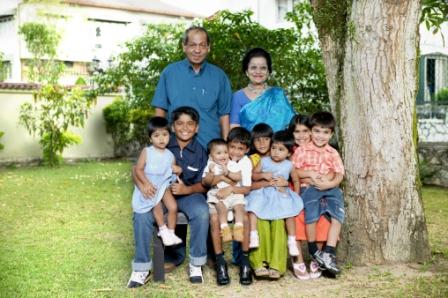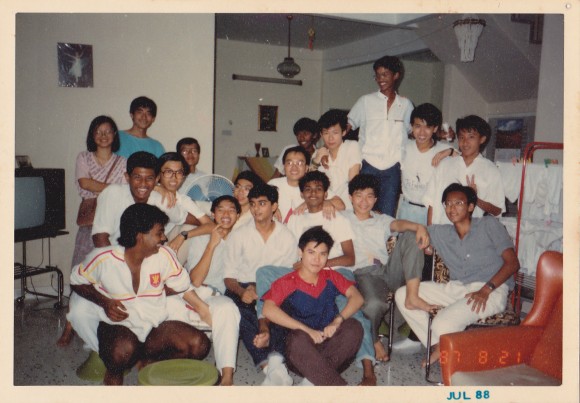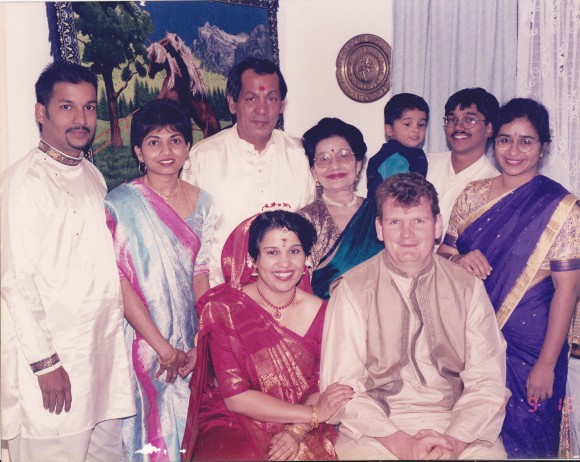PREMESH Chandran laughs when asked if he ever imagined Malaysiakini would become what it is today: the award-winning and leading online media in Malaysia that reaches over 300,000 readers per day in English, Bahasa Malaysia, Chinese and Tamil.
“It grew to be something much bigger than what we expected it to be,” the news portal’s chief executive officer, 42, says of the decision he and editor Steven Gan made in 1999 to launch Malaysiakini.
There has since been a spurt of other online news sites, some competing directly with Malaysiakini. But there’s no doubt that it was a trailblazer in providing independent news at a time when online media had not yet taken off.

- (Pics below courtesy of Premesh Chandran)
For its efforts, Malaysiakini has won various international awards, including from Asiaweek, Businessweek, the International Press Institute, the Committee to Protect Journalism, and Reporters San Frontiers. The site has also been featured in various reputable publications and media, and is the only media organisation in Southeast Asia to be nominated to the World Economic Forum’s International Media Council.
Apart from Malaysiakini, Premesh’s passions include science, social entrepreneurship and human rights. He has been a democracy activist since his university days in Australia. In this interview at the Malaysiakini office in Kuala Lumpur on 13 July 2011, he talks about how his student activism in Australia influenced the decisions he made.
The youngest of three children of mixed parentage, Premesh also talks about why he returned to Malaysia, and why he remains committed to media freedom.
TNG: When and where were you born, and where did you grow up?
I was born in University Hospital (now known as University Malaya Medical Centre) in 1969. I grew up in Section 12, which is just outside Universiti Malaya.
Is that where you lived for the most part of your life?
I did, until 1989 when I was 20 and went to Australia to study.
I went to [primary] school in (Sekolah) Sri Petaling, which is on one side of Section 12, and I went to [secondary] school in (SMK Sultan Abdul) Samad, which is on the other side of Jalan Kemajuan.
Can you trace your ancestry?
My mother is Bengali from Calcutta, although now most of her family is spread out throughout Calcutta and Delhi.
My father was born in Malaysia, in Sungai Petani, Kedah. He was born in 1943 during the Japanese Occupation. My grandfather was born in 1910 in Sungai Petani. My great-grandfather was from Jaffna, and moved to Malaya, where he helped manage one of the plantations in Sungai Petani.
Do you know what your grandfather did?
My grandfather worked in the Health Ministry most of the time. And the interesting part about him was that [in the mid-50s] he ran the leprosy centre in Sungai Buloh.
What did your father work as?
My father qualified as a radiographer [and] worked in University Hospital. Later, he went into business, manufacturing pumps and valves and building water treatment plants for the Public Works Department.
What about your mum? Was she born here or in India?
She was born in Calcutta in 1941 and she met my dad when they were studying (radiography) together in the UK. She was a full-time mum until she worked with my dad when I was 12.

Do you have siblings?
I have one elder brother and one elder sister. My brother is here. And my sister is in Sydney.
So has she given up her citizenship?
Yes, all three: both my parents and my sister have become Australian citizens. My parents left Malaysia in 1988. My sister was studying in India at the time, and joined us in Australia, after she completed her studies.
Were you conscious of the notion of race when you were growing up?
I think I first became conscious of all that after secondary school. Because one of the reasons my parents migrated was that in my father’s business, a lot of the contracts started to be given to bumiputera companies. That caused a major downfall to his business. That was when I was in Form Four and Form Five.
[But race] was not a matter that affected me and my friends.
How did your parents take it? Was there a lot of resentment?
They never expressed anything to us, their children, but the family was just about bankrupt. We lost the house, we lost the car. We lost just about everything.
And the family split up. So my mother and my brother went to Delhi to stay with her side of the family. My sister was studying in India at that time. My father was on his own here. And I was on my own.
I opted to stay back and do my Form Six, but I had to basically survive pretty much on my own. Friends helped me get through those couple of years.
And you grew up a Hindu?
Ya. Not a very good one (chuckles). I’m more spiritual than religious. And I don’t speak Tamil. I think that’s an issue for some people.
So what did you speak when you were growing up?
English. My mother spoke Bengali, Hindi and English. My dad spoke Tamil, Malay and English.
I grew up in an English-speaking household. Culturally, it was a mix of Western and Hindu norms, for better or for worse. We celebrated Deepavali but were not Tamil-speaking. We didn’t watch Tamil movies. We didn’t associate with Tamil culture. I think today, it’s become a bit of a handicap because everyone expects you to speak Tamil. And it is a handicap for someone of Indian origin not to speak Tamil or not to speak an Indian language.
You studied for several years in Australia, right? And you had the option of staying on in Australia, didn’t you?
Ya, I did. I had PR (permanent residence) when I was a university student because my parents had already moved there.
So why did you come back to Malaysia?
Er (laughs), good question. In my later years during my degree, I got more politically involved. Although I finished my degree in Physics, I wasn’t interested to carry on in Physics. Because of my interest in politics, it made more sense to come back to Malaysia and start things in Malaysia. I came back in 1992.
There must have been a defining moment that made you decide to come back instead of stay on in Australia where your family was, and where life was, for certain, better.
It’s hard to say there was a defining moment. But I think there were a lot of political activities I was involved in through Nosca (the Network of Overseas Student Collectives in Australia) with people like Tian Chua, Eli (Elizabeth Wong), Steven (Gan) and lots of other people who were also student activists. Over the years, I developed the inclination to come back. And I felt more at home here in Malaysia than in Australia.

The good thing about Nosca was that because it [involved foreign students], we learnt a lot about political issues elsewhere. About Burma, Thailand, East Timor, Indonesia, China, for example. All over Asia we could see students who were at the forefront of democracy. And a lot of them had come to Australia. And they were like-minded: pro-democracy. They got together and worked in Nosca. So that gave us a very international perspective about democracy and human rights.
By and large, the Malaysian students were very conservative. There were very few Malaysians who were interested in politics.
What keeps you staying here when they could be better opportunities elsewhere?
Having travelled the world and seen so many cities, I think Malaysia is a great country. I think we undervalue the country, the people, the culture, the multiethnic nature of the country. Of course there are a lot of political changes that need to happen, and changes to how we treat the less privileged.
No regrets?
No regrets. And with my children, it’s really up to them where they want to go.
But you will stay here? This is home for you?
I like it here. But if something interesting comes along, I have no problems moving somewhere else. I don’t think we should be dogmatic about it. In this age of Facebook and Skype, I know more about people I follow on Facebook halfway across the world than I know about some people close by.
So, the whole idea of where is home, your personal geography, is no longer site- or physical-specific. The level of keeping in touch with people is no longer based on physical proximity.
Are there any things about Malaysia that you’re extremely frustrated about?
I’m sad that the current Malaysian government doesn’t see the value of opening up politically. They don’t see how much richer this country could be by having a more liberal democracy, and how much poorer the country is by putting so many limits in place in their struggle to remain in power.
I think somebody mentioned the other day that Umno is now the longest-serving political party in the world. People don’t see the idea of losing power as a form of catharsis and renewal. And the opportunities that brings. I think that’s a shame.
Why did you start Malaysiakini with Steven in 1999?
Both Steven and I had been working on media stuff for a long time. In Australia, Nosca published a magazine called Default. Steven and I also published ASA Magazine for the Hong Kong-based Asian Students Association, when we were back in KL in 1992.
Both of us joined theSun when it was started in 1994. We both had the belief that a more open and liberal media would bring changes to the country. The control over information and the media is such a critical ingredient to preventing democratic change.
Obviously, it’s not the only point of control. There’s also the police, the judiciary and others, but media independence is probably one of the top three things you need for a country to move forward politically.

Did you ever imagine that it would be what it is today?
(Chuckles) Actually, no (laughs). Mostly, we were just trying something which we hoped would have some small impact, but it grew to be something much bigger than what we expected it to be.
I think the lesson is we don’t know what will lead to what. I mean, the guy who burnt himself in Tunisia. I think when he did it, he never imagined what it would lead to; it was a personal statement. So, I think the lesson is to keep trying. Never underestimate the power of a small contribution to change, for before you know it, it can really grow into something.
Describe the kind of Malaysia you would like for yourself and future generations.
A Malaysia which embraces its multicultural, multiethnic, multireligious nature. One which very much is the hub of what is happening here in Asia: this energy and growth that we are experiencing around us. One which can be the nexus between the Islamic world, the Western world, the Chinese world, the Hindu civilisation. [We could] position ourselves as this great place where the parts of Asia come together.
Of course, we also need to take care of those who are less able and less privileged. And [we need to give people] the opportunity to excel and become world leaders in their field.
Malaysians are very talented and you can see it all over the world. If [only] we [could] build that recognition for those who can really excel to succeed regardless of ethnic origin, class and religion.
Actually, we already had it. When you talk about being a nexus, we already were, historically. But you’re talking about it as if we need to recover it.
I think we’re losing it, undermining it. We need to have a basic value proposition about what our society is and build the country around that value. Like how America built itself as a melting pot, as a frontier, as an entrepreneurial society.
And 1Malaysia is not it?
1Malaysia could be it if it were really practised. But a slogan, if it is not practised, just becomes a symbol of hypocrisy. So today, as it stands, 1Malaysia is a symbol of hypocrisy. It’s a nice slogan but we really need to practise it.
Although we are divided at times, we need to build a common future, a future all Malaysians can embrace. And that’s what we lack at the moment. ![]()
The book Found in Malaysia, featuring 50 of our best interviews plus four previously unpublished ones with Datuk Zaid Ibrahim, Tan Sri Rafidah Aziz, Datin Paduka Marina Mahathir and Ramli Ibrahim, is available at all good bookstores for RM45.


Premesh says
Thanks for the write up!
DLim says
How true! We lack a common future indeed. Politicians have been talking about individual ethnic and religious rights, never ‘Malaysian’ rights.
kate says
I don’t know why it is so hard to understand that some Indians may not be able to speak Tamil or Malayalam or any of the Indian languages. English would be the language of choice if both parents speak totally different dialects. Only in Malaysia is being English-speaking seen as a stumbling block. Good work, Mr Chandran – thank you and Steven Gan for Malaysiakini… long may you live in cyberspace 🙂